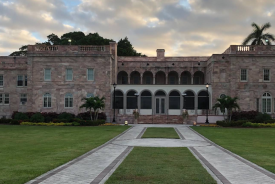Michael Deng: 37 Baruch College Pi Delta Psi Fraternity Members Charged in 2013 Hazing Death
By37 members of the Baruch College chapter of the Pi Delta Psi fraternity will face criminal charges in Pennsylvania in relation to the 2013 death of Chun Hsien Deng.
According to The New York Times, five members will be charged with third-degree murder, sometimes referred to as voluntary manslaughter. The other 32 members face charges including assault, hindering apprehension, conspiracy, and hazing.
Deng, who went by Michael, was a 19-year-old freshman at Baruch trying to join the fraternity when he went with other pledges and fraternity members on a weekend trip to the Poconos in Dec. 2013. The pledges were forced to walk across a field in the freezing cold while blindfolded and given a backpack filled with sand to carry. As the pledges went, fraternity members would tackle them at random.
On one such occasion, a fraternity member "speared" Deng by lifting him off his feet before tackling him to the ground. Authorities stated this was when Deng started complaining about a headache, but was force to continue with what was apparently a pledge ritual, The Times reported.
Deng later collapsed and died, but authorities also believe the fraternity members delayed seeking emergency medical attention for the 19-year-old freshman. NBC News reported the members called the Pi Delta Psi national president, Andy Meng, before calling an ambulance. Meng faces charges for allegedly advising the fraternity members to hide anything with the Pi Delta Psi emblem on it.
The medical examiner who analyzed Deng's body concluded that this apparent, inexplicable delay in calling emergency services was detrimental for Deng.
The Associated Press learned the police will make their arrests in "waves" to keep the courts from handling too many defendants at once. The police will also start by arresting those with the least serious charges against them and continue by trending upward.
Deng's family have already filed a lawsuit against Baruch College and the Pi Delta Psi fraternity.
"Too many families have been devastated as a result of fraternity hazing, with at least one student dying every year from hazing since 1970," Douglas Fierberg, the family's attorney, told NBC News. "Fraternities and their members must be held accountable, and this step by authorities is an important one," he said. "Michael was a wonderful, beloved young man, and, in his honor, the family will also continue pursuing its wrongful death case against the fraternity to cause it and other fraternities to change so that other parents will be spared the loss of a precious child."
© 2025 University Herald, All rights reserved. Do not reproduce without permission.








